Welcome to the creme de la creme, the number one through ten prospects. In case you missed it number 11 through 20 are here, and number 21 to 30 are here.
We hope you enjoyed this top 30 and the hope it brings to the future of the Blue Jays organization. Check back tomorrow for a few who missed the top 30.
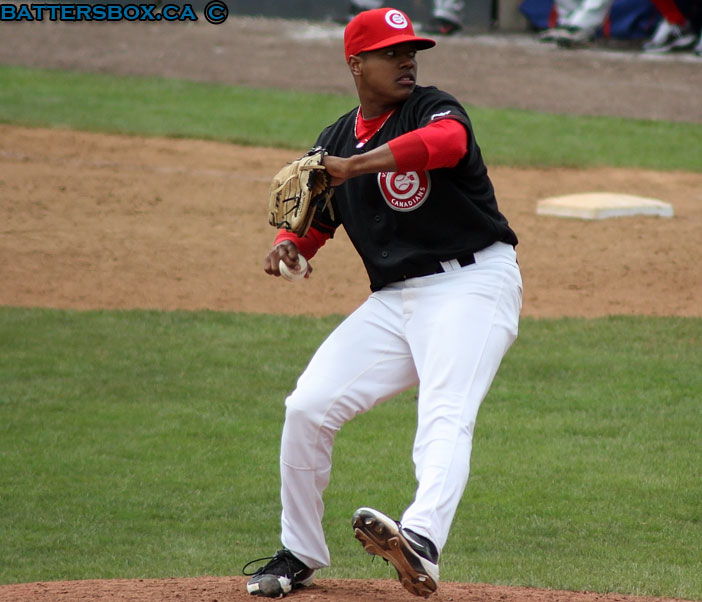
10. Marcus Stroman | RHP
| Year | Age | Level | G | GS | IP | H/9 | HR/9 | BB/9 | K/9 | ERA |
| 2012 |
21 |
RK | 7 |
0 |
11.1 |
6.4 |
0.0 |
2.4 |
11.9 |
3.18 |
| 2012 |
21 |
AA |
8 |
0 |
8 |
9 |
1.1 |
6.8 |
9.0 |
3.38 |
You can't write up Stroman without acknowledging the 50 game suspension. Though he came out of the draft with the label of the pick most likely to reach the majors first, any doubt he would pitch with the Blue Jays in 2012 was wiped away by the suspension (despite the curious quirk of the rules which would have allowed him to pitch in the majors despite the suspension). Stroman will not be able to join his 2013 teammates, presumably the Dunedin squad but possibly New Hampshire, until the third week of May.
The predictions of a fast track to the majors presumed, of course, that he was brought along, at least initially, as a reliever (in the mold of the Chicago White Sox's Chris Sale). There's no clear indication whether the Jays plan to do that, or to take the slower road and develop him with an eye towards the starting rotation. If the latter, Stroman's outstanding slider will have to be complimented by an improvement in his fastball, as well as one or more secondary pitches.Still, it's not beyond the realm of possibility that development and circumstances would combine to put him in a Toronto uniform by the end of the coming season. It will be interesting to see how willing the Blue Jays are to buy in to Stroman's defiance of the conventional wisdom that a (relatively) short man can't succeed as a major league starter.
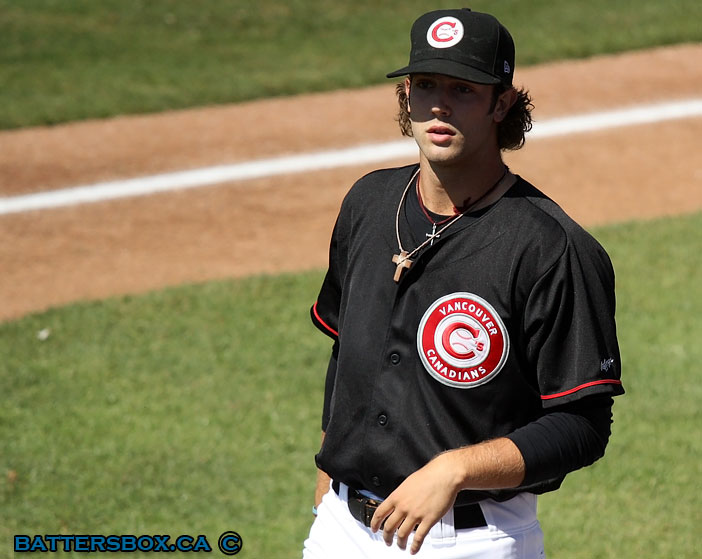
9. Daniel Norris | LHP
| Year | Age | Level | G | GS | IP | H/9 | HR/9 | BB/9 | K/9 | ERA |
| 2012 |
19 |
RK | 11 |
10 |
35.0 |
11.3 |
1.0 |
3.3 |
9.8 |
7.97 |
| 2012 |
19 |
A- | 2 |
2 |
7.2 |
16.4 |
0.0 |
5.9 |
5.9 |
10.57 |
| 2012 |
19 |
A- | 2 |
2 |
7.2 |
16.4 |
0.0 |
5.9 |
5.9 |
10.57 |
Norris famously fell to the fourth round and 74th overall pick in the 2011 draft because of his bonus demands, where the Blue Jays selected him and were able to convince him to sign for a $2 million bonus. Although that was half of what Norris was reportedly asking, it was still at that point the fourth highest bonus in franchise history. The southpaw had been named the best high school prospect by Perfect Game that year. He was also named Baseball America’s High School Pitcher of the Year in 2010 and won the Jackie Robinson Award the same year as the best high school player nationally. Prior to the draft, Baseball America named him the 16th-best draft-eligible prospect and Keith Law ranked him 33rd.
Norris stands 6’2” and weighs 210 pounds. His repertoire includes four pitches that he throws from a three-quarters arm angle. Norris’ main weapon is a fastball that can reach 96, but usually sits closer to 92. He also throws an inconsistent curveball that sits in the mid-70’s with tight spin but low velocity; a change-up that that can be deceptive and sits around 83 and a still-developing slider in the mid-80’s that is used mainly against right-handed batters. Prior to the draft, scouts were split about whether the curve or change-up was Norris’ second-best pitch, although they noted that his slider remained a work in progress.
One thing that may have caused teams to shy away from Norris and his bonus demands was that his delivery was inconsistent and caused him to have command issues. Although not uncommon among high school pitchers and although the minor league coaching staff has plenty of time to correct Norris’ flaws, some high school pitchers never make those adjustments.
Some of those issues were evident during Norris’ first season as a professional, which he spent entirely with Bluefield except for two starts with the Vancouver Canadians. Norris walked 18 batters over 42.2 innings. He surrendered 58 hits and struck out 43. He put up an 8.44 ERA on the year, but that’s not really important for Norris at this stage.
Norris sounds very humble in interviews and speaks of his determination to work hard and succeed. His makeup, including his passion for the sport, consistently garnered praise in pre-draft scouting reports. Prior to the season, he was rated the 93rd best prospect in the sport by Baseball America and although his season wasn’t particularly successful, his ceiling may allow him to sneak onto the back end of the Top 100 list again this offseason. He is one of the few arms in the system who has the upside of a true #1 or #2 starter.
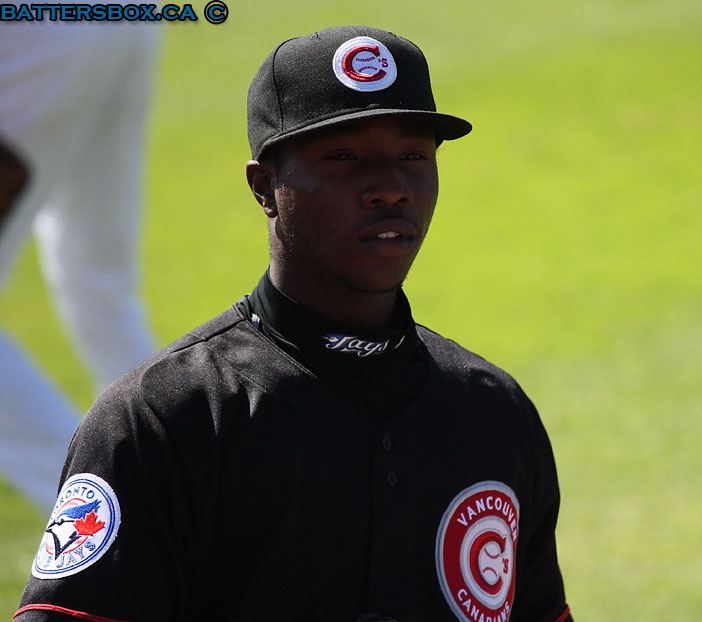
8. DJ Davis | OF
| Year | Age | Level | AB | 2B | 3B | HR | BB | K | SB | CS | AVG | OBP | SLG |
| 2012 |
17 |
Rk |
163 |
7 |
2 |
4 |
18 |
54 |
18 |
7 |
.233 |
.339 |
.374 |
| 2012 |
17 |
Rk |
47 |
3 |
1 |
1 |
4 |
10 |
6 |
2 |
.340 |
.415 |
.511 |
| 2012 |
17 |
A- |
18 |
0 |
0 |
0 |
5 |
6 |
1 |
1 |
.167 |
.348 |
.167 |
Davis told The Toronto Sun that he needs to work on swinging at pitches in the strike zone and how to get to ground balls in the gap. Davis is said to have excellent range in center field and gets a good jump on fly balls but he does not have the strongest arm. According to Gulf Coast League manager Omar Malave, Davis “has a nice, compact line drive swing…and will hit with occasional power. “ Baseball America, who rated Davis as the Gulf Coast League’s number three prospect, says he needs to work on using the lower half of his body in his swing and to improve his recognition of offspeed pitches.
Davis has shown the ability to draw a walk with 27 free passes in 266 plate appearances but he also struck out just over 27 percent of the time. He made three stops in the minor league system, getting promoted to Bluefield and Vancouver. He joined the Canadians in time for their playoff drive where he had his struggles with the bat. He was 0-for-10 with six strikeouts in the first two games of the Northwest League final against Boise but he bounced back with a 3-for-5 effort with a run scored in the third and final game to help the C’s defend its league title.
Though he advanced a pair of levels in 2012, Davis will probably get a bit more seasoning in Vancouver before climbing the minor league ladder in 2013. He will turn 19 on July 25.
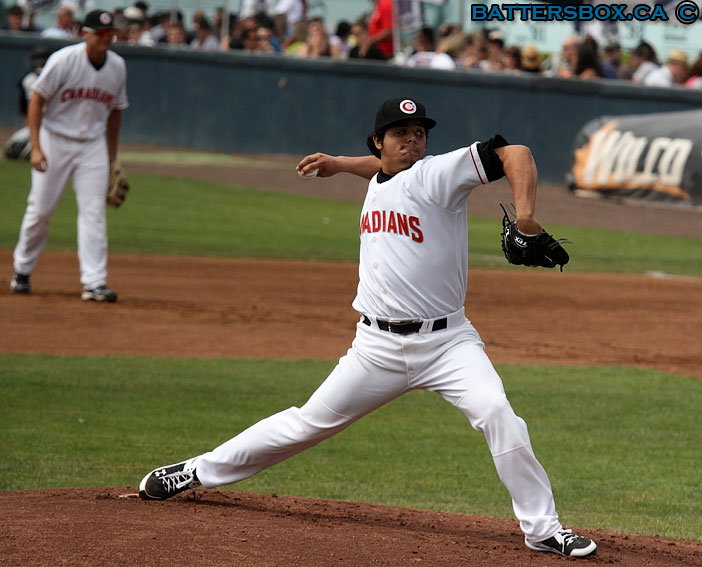
7. Roberto Osuna | RHP
| Year | Age | Level | G | GS | IP | H/9 | HR/9 | BB/9 | K/9 | ERA |
| 2011 |
16 | MEX | 13 | 2 | 19.2 | 11.4 | 1.4 | 5.0 | 5.5 | 5.49 |
| 2012 |
17 | RK | 7 | 4 | 24.0 | 6.8 | 0.4 | 2.3 | 9.0 | 1.50 |
| 2012 |
17 | A- |
5 | 5 | 19.2 | 6.4 | 0.5 | 4.1 | 11.4 | 3.20 |
One of the most sought after international free agents to sign from the 2011 class, Osuna stepped right into short season ball and gave the Jays a glimpse of what could well be a very bright future. At just 17 years of age, but measuring 6'2" and 230 pounds, Osuna carved up the Appalachian League in just seven appearances. From there, he was promoted to Vancouver and debuted with one of the best performances of the Jays minor league season by striking out 13 in just five innings of work.
Osuna is still a little rough around the edges but that's hardly a knock on a guy who was pitching in Mexico's highest level at the age of 16. Featuring a low to mid 90s fastball with excellent swing-and-miss stuff, Osuna will likely spend the spring in Extended before making his 2013 debut with one of the short season teams. He's still a long ways away but given his age, stuff and results to date, it wouldn't be much of a surprise to see him move up a few notches come this time next year.
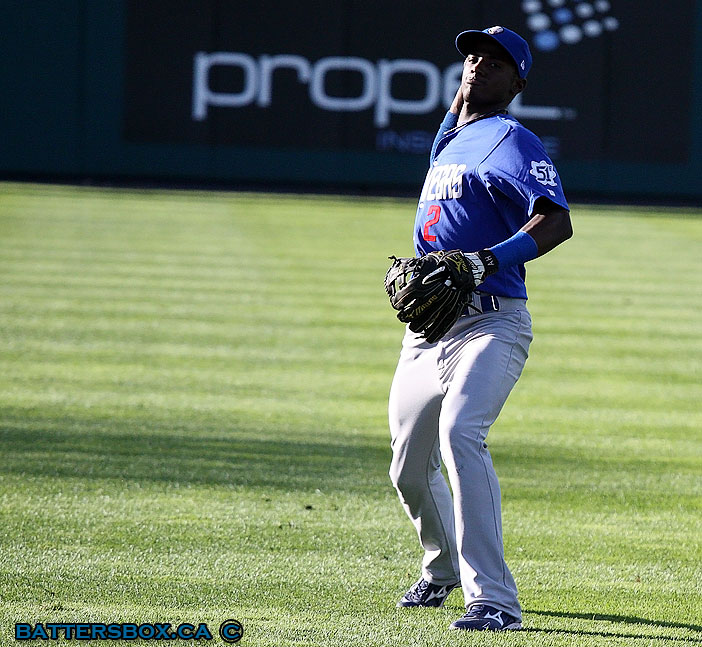
6. Adeiny Hechavarria | SS
| Year | Age | Level | AB | 2B | 3B | HR | BB | K | SB | CS | AVG | OBP | SLG |
| 2010 |
21 |
A+ |
161 |
7 |
3 |
1 |
5 |
25 |
7 |
0 |
.193 |
.217 |
.292 |
| 2010 |
21 |
AA |
253 |
11 |
1 |
3 |
12 |
40 |
6 |
3 |
.273 |
.305 |
.360 |
| 2011 |
22 |
AA |
464 |
22 |
6 |
6 |
25 |
78 |
19 |
13 |
.235 |
.275 |
.347 |
| 2011 |
22 |
AAA |
108 |
6 |
2 |
2 |
8 |
21 |
1 |
2 |
.389 |
.431 |
.537 |
| 2012 |
23 |
AAA |
443 |
20 |
6 |
6 |
38 |
86 |
8 |
2 |
.312 |
.363 |
.424 |
| 2012 |
23 |
MLB |
126 |
8 |
0 |
2 |
4 |
32 |
0 |
0 |
.254 |
.280 |
.365 |
Hechavarria made his big league debut for the Blue Jays in 2012, just two years after signing a 4-year, $10 million contract as a free agent from Cuba. Lauded for his plus defence by scouts, he enjoyed his best minor league season yet with the bat and earned a berth in the Triple-A All-Star Game in Buffalo, the home of the Jays new Triple-A affiliate. He was also rated the 14th best prospect in the Pacific Coast League by Baseball America.
The 5-foot-11 right-handed hitting shortstop got the call to Toronto August 4 after Brett Lawrie hurt his oblique August 4. His first career hit came against Tampa Bay August 7. He was sent back down to Las Vegas August 25th when Yunel Escobar returned from paternity leave. His demotion lasted all of one day after Jose Bautista and David Cooper went to the disabled list. Two days after that, he belted his first home run off the New York Yankees Phil Hughes.
Hechavarria batted just .204 in August but came to life in September by hitting .292. However, he struck out over 23 percent of the time and drew a walk less than three percent of the time - a drop of nearly five percent from his walk rate in Las Vegas. Still, former Jays manager John Farrell praised the young Cuban for his improved plate discipline and his all-fields hitting approach late in the season.
Hechavarria also showed his versatility in the field by playing second base and third base in addition to short. Las Vegas manager Marty Brown says Hechavarria showed good instincts, range and anticipation when the ball is hit but Baseball America notes he has a tendency to flip his throws to first. He won the R. Howard Webster award as the Jays top minor leaguer in Las Vegas.
Hechavarria hopes to celebrate his 24th birthday April 15 by wearing a Jays uniform. That will depend on whether Escobar remains with the club along with any other off-season developments. The Jays would probably like to send Hechavarria back to Triple-A for a little more seasoning and see how he will fare in the more normalized hitting environment of Buffalo.
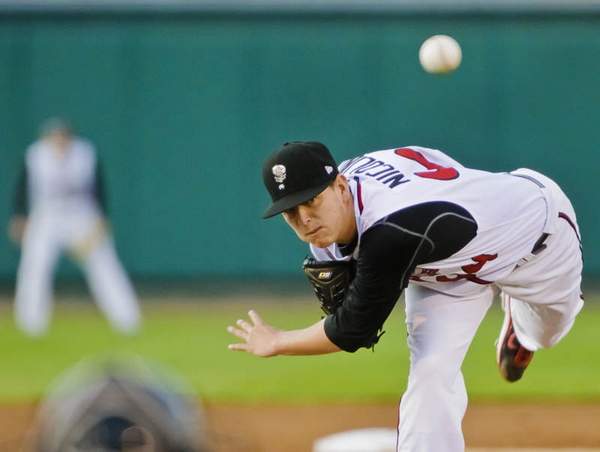
5. Justin Nicolino | LHP
| Year | Age | Level | G | GS | IP | H/9 | HR/9 | BB/9 | K/9 | ERA |
| 2011 |
19 |
A- |
12 |
9 |
52.1 |
4.82 |
0.0 |
1.89 |
11.01 |
1.03 |
| 2011 |
19 |
A |
3 |
3 |
8.2 |
11.42 |
0.0 |
2.08 |
9.35 |
3.12 |
| 2012 |
20 |
A |
28 |
22 |
124.1 |
8.1 |
0.4 |
1.5 |
8.6 |
2.46 |
The lefty among the Lansing "Big 3", Nicolino is also widely considered to be the most polished and advanced of the three (though not the one with the highest ceiling). Ask a scout about Nicolino and it's not unusual to hear the name "Tom Glavine" mentioned, ask a Jays fan and the Jimmy Key comparisons come easily. The 6'3" Nicolino brings a fastball with plus movement and command and improving velocity (registering in the low 90's regularly with the potential for a tic or two more) as a compliment to a top-shelf change-up. He's working on a curve which has shown significant improvement. Like his rotation mates covered in this list, he's a lock to open 2013 in Dunedin, and of the three has a half-step (at least) lead in the race to be the first to AA.
It's not a crazy thing to suppose that if the circumstances worked in his favor, he could follow the footsteps of Drew Hutchison and leapfrog into a major league job very quickly, though certainly the team would hope that their upper level depth holds up a bit better than that this time around.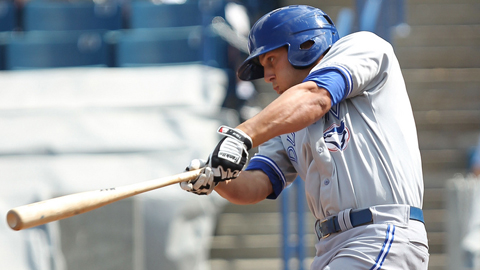
4. Jake Marisnick | OF
| Year | Age | Level | AB | 2B | 3B | HR | BB | K | SB | CS | AVG | OBP | SLG |
| 2010 |
19 |
R |
122 |
12 |
0 |
3 |
13 |
18 |
14 |
1 |
.287 |
.373 |
.459 |
| 2010 |
19 |
A |
127 |
8 |
2 |
1 |
9 |
37 |
9 |
2 |
.220 |
.298 |
.339 |
| 2011 |
20 |
A |
462 |
26 |
7 |
14 |
43 |
91 |
37 |
8 |
.320 |
.392 |
.500 |
| 2012 |
21 |
A+ |
266 |
18 |
7 |
6 |
26 |
55 |
10 |
5 |
.263 |
.349 |
.451 |
| 2012 |
21 |
AA |
223 |
11 |
3 |
2 |
11 |
45 |
14 |
4 |
.233 |
.286 |
.336 |
Jake Marisnick came into 2012 as one of the Jays top prospects and he is still considered a top prospect even after a challenging 2012. Marisnick started the season in Dunedin where he posted a wRC+ of 127 in the difficult hitting environment of the Florida State League. Marisnick was promoted to AA mid-season where his numbers fell off. Marisnick did not hit well, did not walk and did not hit for much power. He did not strike out a lot (20%) but he did not get good wood on the ball. The Jays said at the end of the season that they were working to make some changes to his swing. He was assigned to the Arizona Fall League to get him more at-bats against better pitching.
Marisnick has five tool potential. He is a very good centre-fielder with a strong arm. He can run and steal bases and he does have power potential in his bat. He just needs to start making better contact in AA.
Marisnick will return to AA for 2013 where he will turn 22 just as the season starts.
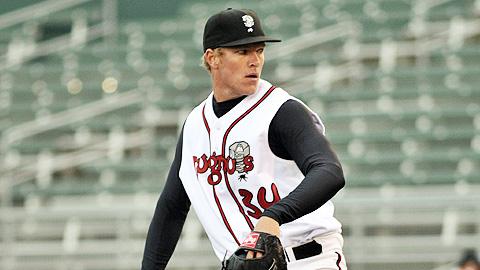
3. Noah Syndergaard | RHP
| Year | Age | Level | G | GS | IP | H/9 | HR/9 | BB/9 | K/9 | ERA |
| 2010 |
17 |
Rk |
5 |
5 |
13.1 |
7.6 |
0.0 |
2.7 |
4.1 |
2.70 |
| 2011 |
18 |
A- |
7 |
5 |
32.0 |
6.5 |
0.3 |
3.1 |
10.4 |
1.41 |
| 2011 |
18 |
A- |
4 |
4 |
18.0 |
7.5 |
0.0 |
2.5 |
11.0 |
2.00 |
| 2011 |
18 |
A |
2 | 2 | 9.0 |
8.0 |
0.0 |
2.0 |
9.0 |
3.00 |
| 2012 |
19 |
A |
27 |
19 |
103.2 |
7.0 |
0.3 |
2.7 |
10.6 |
2.60 |
Noah Syndergaard was drafted with the compensation pick the Jays received for not signing James Paxton. Paxton has proven himself to be a fine prospect and should be appearing on Top 100 prospects this offseason alongside the player the Jays drafted as his replacement.
The 6’7” right-hander was thought of as a signable pick out of high school, but the 17-year-old power pitcher was clocked as high as 97 MPH in the months leading up to the draft. He pitched briefly in Rookie Ball in 2010 and Syndergaard started 2011 in extended spring training before throwing 59 innings across three levels, finishing the season in Lansing. Syndergaard pitched well everywhere, not allowing any homers, keeping his walk total relatively low and racking up the strikeouts.
In 2012 it was more of the same for Syndergaard. He spent the whole year in Lansing and continued to rack up strikeouts, maintain a respectable walk total and keep the ball in the ballpark. Syndergaard was part of the notorious tandem starter setup for the Lugnuts, and he made 19 starts and 8 relief appearances. He threw 103.2 IP, with a 2.60 ERA. He allowed 81 hits, 31 walks and struck out 122. The tall Texan has only allowed four homers in 176 professional innings.
Scouting reports on Syndergaard are impressive. Routinely clocking in the upper 90s, Syndergaard complements his heat with an already above-average curve and a developing change up. His delivery is described as easy and effortless, which can be rare in someone with his size and youth. It looks like he’ll spend next season in High-A, where the Jays will continue to protect what may the crown jewel of their elite low-minor league arms.
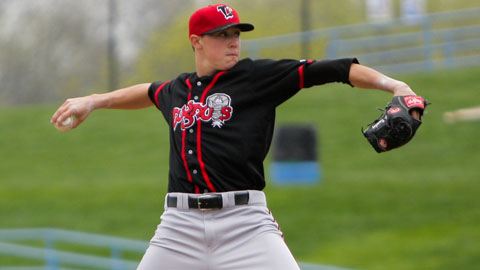
2. Aaron Sanchez | RHP
| Year | Age | Level | G | GS | IP | H/9 | HR/9 | BB/9 | K/9 | ERA |
| 2010 |
18 |
RK |
8 | 8 | 19.0 | 9.0 | 0.5 | 5.7 | 13.3 |
1.42 |
| 2010 | 18 | RK |
2 | 2 | 6.0 | 6.0 | 0.0 | 7.5 | 13.5 | 4.50 |
| 2011 | 19 | RK | 11 | 6 | 42.2 | 9.6 | 0.9 | 3.8 | 9.1 | 5.48 |
| 2011 | 19 | A- | 3 | 3 | 11.2 | 6.2 | 0.0 | 6.2 | 10.0 | 4.63 |
| 2012 |
20 | A |
25 |
18 | 90.1 |
6.4 | 0.3 | 5.1 | 9.7 | 2.49 |
Two years after being scooped up early in the Supplemental First Round, Sanchez is, in many eyes, on the verge of being considered an elite prospect. While his results don't always match those of his rotation mates Justin Nicolino and Noah Syndergaard, scouts drool over Sanchez's mix of swing-and-miss fastball and complement of off-speed pitches.
Sanchez was brought along slowly in 2012, tandem starting and going anywhere from 3-5 innings each time out. And while he still has a tendency to allow too many free passes, he's virtually unhittable when around the plate and most observers feel his command needs refinement rather than an overhaul.
Sanchez will likely begin the 2013 season in the Dunedin rotation along with the other two-thirds of the "Lansing Trio". If things continue to click, Sanchez will be the favourite to head this list next year and could see the majors some time in the 2015 season.
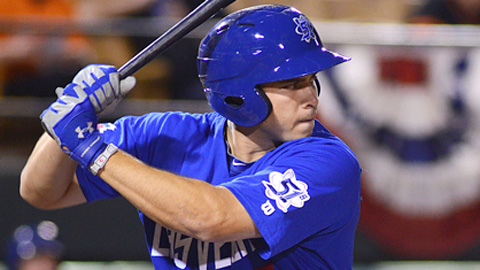
1. Travis d'Arnaud | C
| Year | Age | Level | AB | 2B | 3B | HR | BB | K | SB | CS | AVG | OBP | SLG |
| 2008 |
19 |
A |
64 |
5 |
0 |
2 |
5 |
10 |
0 |
0 |
.297 |
.357 |
.469 |
| 2009 |
19 |
A |
482 |
38 |
1 |
13 |
41 |
75 |
8 |
4 |
.255 |
.319 |
.419 |
| 2010 |
20 |
A+ |
263 |
20 |
1 |
6 |
20 |
63 |
3 |
1 |
.259 |
.315 | .411 |
| 2011 |
21 |
AA |
424 |
33 |
1 |
21 |
33 |
100 | 4 |
2 |
.311 |
.371 |
.542 |
| 2012 |
22 |
AAA |
279 |
21 |
2 |
16 |
10 |
59 |
1 |
1 |
.333 |
.380 |
.595 |
The 23-year-old catcher appeared in just 67 games at the triple-A level in 2012 before injuring his knee. The lost time shouldn't hurt because d'Arnaud was pretty much a finished product when the injury occurred. However, the organization is committed to incumbent backstop J.P. Arencibia, thanks in part to his rapport with the pitching staff, so d'Arnaud is likely headed back for a second tour of duty at the triple-A level. With the club looking to make significant upgrades during the off-season - according to comments from General Manager Alex Anthopoulos - d'Arnaud could also be trade bait as the club looks to make a splash (You have to give talent to get talent). The organization has further catching depth behind the prospect in the form of A.J. Jimenez and Santiago Nessy.




